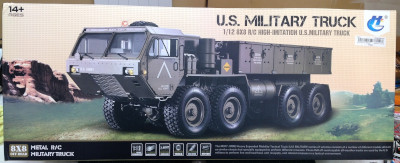HEMTT Project
Page 1: RTR Original
This model comes in a massive box covered in descriptive text and
photos. The box does not explicitly identify the truck as a HEMTT
in the title, but the explanatory text does. The Oshkosh logo
never appears on the vehicle.
The side panel shows the chassis from the bottom as well as the
alternate desert tan tractor truck version, the P802. Inside the
box you'll find a high density foam carrying case with hinges, magnetic
clasps, and a handle. I didn't at first understand the point of
the ribbons, but they are there to help lift the model from the box
which is almost impossible without them.
The cab of the truck is very detailed. It includes mirrors,
wipers, lights, tow hooks, and even door latches. The front skid
plate is metal, the rest is plastic. You can also see scale
accessories behind the cab including gas cans and an air filter.
The doors open by releasing the outside latch. The seats appear to
air cushioned and the dash and instrument panel are fully
detailed. The pedals are even present. There are two seats
in the cabin with a console in the center. The rear bumper
includes lights, real rubber mud flaps, and a working pintle hitch.
The huge rear beds is removable with 6 screws. It sits atop the
frame rails. The floor of the bed and the vertical rails are
metal. All 6 side panels and the large rear panel can swing open
by releasing the latches. Note that all the handles and tie downs
on the bed were not installed out of the box. That's the only part
which had to be assembled by the user.
Other scale details include a full sized spare tire with a beadlock
wheel just like all the others. There is also a full exhaust
system with heat shield. There's a scale engine under that cover,
but we'll get to that later.
The wheels are beadlock style and very sturdy. A scale cover on
each wheel covers the wheel but and makes it look like a planetary
hub. There's also a faux winch with a twine rope attached.
It can rotate manually but is not motorized.
A view from the bottom shows the glorious drivetrain complexity.
All 4 axles are driven via a central transfer case and pass-through
differentials. These are real bevel gear differentials, not locked
spools. All the drive shafts appear to be steel.
From the bottom we can see how the suspension works. Each pair of
axles shares a pair of leaf springs and walking beams. From the
side, you can also see the shock absorbers. These are internally
sprung dampers without oil. Virtually every part of the suspension
and drivetrain is metal.
With the cab removed you can see the dual steering servos. Both of
the front axles are steered via a cable linkage. Behind the cab
is a scale engine. The brushed electric motor is located inside
the engine block and drives a working fan at the front. This fan
actually provides a relevant amount of air flow when the motor is
spinning. There's also a huge turbo and an exhaust pipe with a
metal heat shield on it. The whole engine is hidden by a cover
when everything is assembled, so it is impressive they went to all the
work to make the engine scale accurate.
The rear of the engine outputs to a short drive shaft leading to a
mid-mounted transfer case. Another pair of drive shafts then lead
to the front and rear axle pairs. You can see the shift servo
attached to a spring link which controls access to high and low
gear. Note that shifting occurs in the transfer case and not in
the transmission, so it is a high/low range selection rather than
multiple traditional gears. The brackets between the frame rails
at the back of the
truck are for the battery. This will all be hidden under the cargo
bed when it is installed.
The large fuel tank on the left side of the chassis houses most of the
electronics. Within you'll find the speed controller wishfully
rated at 320A and a 15A voltage regulator to drive the high torque
servos. There's also an additional power output here which will
later be used for the sound kit. The BEC has its own power
switch. On the one hand this means you need to flip two switches
to turn on the model, but it allows you to leave the battery plugged in
without the BEC depleting it. The toolbox on the right side holds
the receiver. In this photo I've already replaced the 8-channel
receiver that came with the model with a 5-channel Spektrum
receiver. All the wiring is nicely hidden when these boxes are
closed.
©2019 Eric Albrecht

